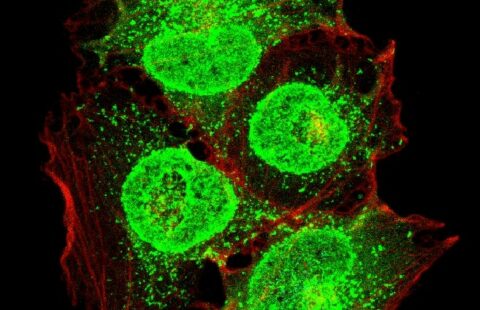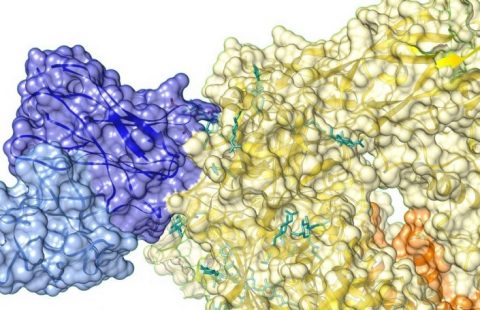The team “Physiopathology and therapeutics of chronic viral hepatitis and related cancers” of the Mondor Institute of Biomedical Research (Inserm/UPEC), located on the premises of Henri Mondor Hospital AP-HP, in collaboration with the researchers of the Centre for Structural Biochemistry (CNRS/Inserm/Montpellier University), with the support of ANRS, has created a whole new family of molecules that inhibit cyclophilins – proteins indispensable to cell metabolism – and have strong therapeutic potential as broad-spectrum antiviral drugs. This discovery, published in Nature Communications on 22 September 2016, also opens the possibility of using these new inhibitors to protect cells in the context of ischaemia-reperfusion (organ transplants, recovery after ischaemic accidents, or neurodegenerative diseases).
Cyclophilins are cellular proteins that play complex and indispensable roles in cell metabolism. They are very often used by viruses to help complete their life cycle. Cyclophilins therefore represent a potential target for broad-spectrum antiviral drugs, i.e. drugs that are effective against many virus families. Cyclophilin inhibitors also have cell protection properties associated with inhibiting the opening of the mitochondrial pore. Unfortunately, the existing inhibitors, all derived from cyclosporin A, present considerable problems that impede their clinical development.
The teams led by Professor Jean-Michel Pawlotsky (Mondor Institute of Biomedical Research [IMR], Henri Mondor Hospital AP-HP, Inserm/University Paris-Est Créteil [UPEC]) and Dr Jean-François Guichou (Centre for Structural Biochemistry [CBS], Montpellier University/CNRS/Inserm), have joined forces and used innovative techniques to create and optimise a whole new family of chemicals that directly target cyclophilins. This work was supported by the French National Agency for Research on AIDS and Viral Hepatitis (ANRS). The new inhibitors thus specifically block the action of cyclophilins by inhibiting the multiplication of viruses from different viral families such as hepatitis C virus, HIV, hepatitis B virus and several coronavirus strains.
This work therefore made it possible to create a whole new family of cyclophilin inhibitors with strong therapeutic potential as broad-spectrum antiviral agents, i.e. active against many viral families for which there is currently no treatment. This discovery also provides an opportunity to use new inhibitors to protect cells in the context of ischaemia-reperfusion (organ transplants, recovery after ischaemic disease, or neurodegenerative diseases).
This work was carried out as part of a close collaboration between Dr Abdelhakim AHMED-BELKACEM and Prof. Jean-Michel PAWLOTSKY for the team “Physiopathology and therapeutics of chronic viral hepatitis and related cancers” (Mondor Institute of Biomedical Research, Inserm/UPEC). It also involves Dr Lionel COLLIANDRE and Dr Jean-François GUICHOU from the Centre for Structural Biochemistry (CBS; Montpellier University/Inserm/CNRS) and researchers from the Institute of Analytical Sciences (ISA; CNRS/ENS Lyon/Claude Bernard Lyon 1 University).
The team “Physiopathology and therapeutics of chronic viral hepatitis and related cancers” at the Mondor Institute of Biomedical Research is developing research on two main themes: the development of broad-spectrum antiviral approaches (building on its experience in the development of new treatments for hepatitis C), and the role of inflammation and the liver microenvironment in the occurrence and progression of primary liver cancers.
Meanwhile, the team “Structures and screening of therapeutic and environmental targets” at the Centre for Structural Biochemistry is developing an integrated approach to spur and rationalise the development of new molecules with potential therapeutic applications, using X-ray crystallography and structural bioinformatics.

